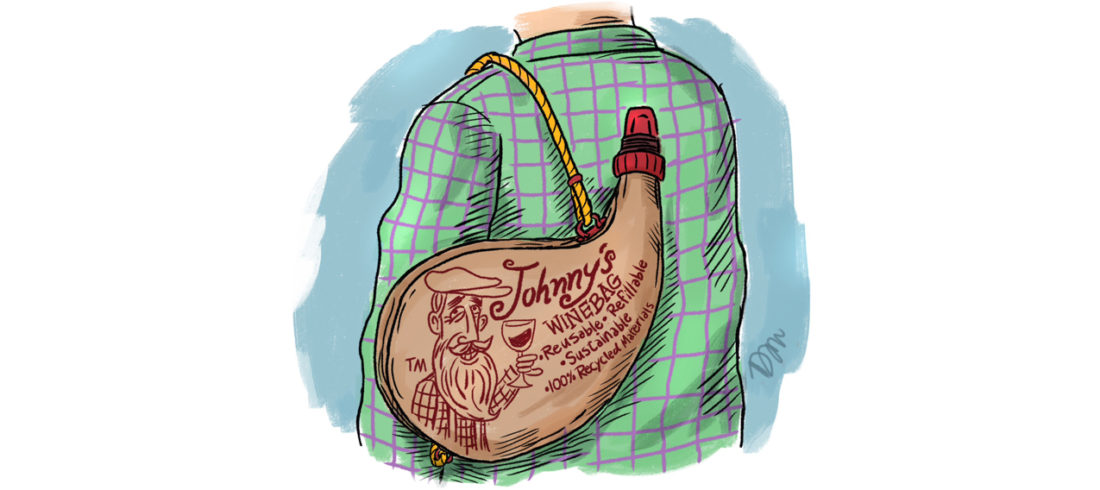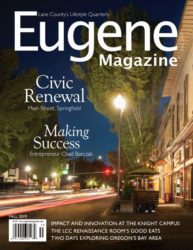There is something special about a good meal complemented by a great bottle of wine. But, there is also something sad about the energy wasted and the environmental impact of the bottle. Between 50 and 70 percent of the energy required to get a bottle of wine to your table is spent on making and transporting the glass alone.
There are sustainable wine distribution options here in Eugene. Sundance Wine Cellars and the Tap and Growler, among others, will fill your container or sell you one if you come in empty-handed. Folks like Jeff Philpot at Velox Wine Works help wineries and local consumer fill-up locations ensure that the wine arrives in toast-worthy condition both here and around the county. But we need casked wine in the store and consumer-provided bottles to become the norm, not the exception.
If bringing in your own bottle for a wine refill seems like a new concept, it is—in Oregon. It only became legal here in 2013. The rest of the world has been refilling bottles for at least 6,000 years. The ubiquitous wine amphora of ancient Greece and Rome were often used repeatedly, either for moving more wine or for secondary storage. Oak barrels became more common a few thousand years ago. The straw-wrapped Chianti bottle was designed to be break-resistant after it was refilled and brought home. It wasn’t until relatively recently that an individual, one-use bottle became the common way to get wine into the hands of the consumer.

I know what you are saying, or at least thinking: “But, I like my bottle with the nice label, and glass is recyclable.” One solution: Just put the bulk wine you buy into your favorite bottle for the table. While glass can be recycled, even in the best of circumstances, that saves only 30 percent of the energy and climate impacts of making new glass. And the best of circumstances mean having a bottle-making plant nearby to avoid the transportation costs of moving (heavy) glass from the recycling consumer to the plant, then the bottler, then back as a new (still heavy) bottle to the consumer. The nearest bottle-making plant that takes used glass is in Portland. High transportation costs and the glut of glass on the market means that sometimes glass is used as a gravel substitute, with a much higher environmental impact than mined gravel.
Another option is boxed wine. Sacré bleu! While boxed wine started with a bad reputation because it was usually bad wine, half that equation has changed. You can now get good wine in a box, and it stays fresh longer than wine in an opened bottle. The change in reputation is taking longer for some people, but a box is an environmental slam dunk. Cardboard is easier to make, very recyclable, and much lighter to transport. The plastic liner is not recyclable locally yet, but its impact is still far less than that of glass—recycled or not.
So, what about reusing wine bottles instead of recycling them? Washing and reusing a bottle saves energy. And the more times the bottle gets reused, the less energy is embodied in it. At my house, we have solar hot water, so even the heat for washing the bottles is impact-free most of the year.
I remember when most beverages came in returnable, reusable bottles. Maybe it’s time to go back to the good old days.
If you are a connoisseur, a bottle may be the best way to save wine for a special occasion years from now. The box is not a good choice for your cellar. But if you want to enjoy a glass of cabernet from a box, rest easy knowing the wine was stored at the winery and put in the bag recently. And, since an estimated 95 percent of the wine bought by individuals is consumed within a week of purchase, it will be fine in your container or the box until it is consumed. No bottle is needed. You use your wine glasses over and over, why use the bottle only once? Why use it at all?
I’ll drink to that. Clink clink.
Looking to fill up your wine growler? Check out one of these local places.
The Steel Pail
3007 N Delta Hwy.
Mon–Wed, 11 am-9 pm; Thurs–Fri, 11 am-10 pm; Sat, 12 pm-10 pm; Sun, 12 pm-8 pm
thesteelpail.com
The Tap and Growler
207 E 5th Ave.
Sun–Thurs, 11:30 am-9 pm; Fri & Sat, 11:30 am-10 pm
tapandgrowler.com
The Filling Station
2747 River Rd.
Mon–Thurs & Sun 2pm–8pm, Fri & Sat 11am-10pm
thefillingstationeugene.com
Sundance Wine Cellars
Tes–Sat 10am-7pm, SunMon 12pm-7pm
Wine tastings on Fri & Sat from 5-7pm
orwines.com/sundance_wine_cellars

